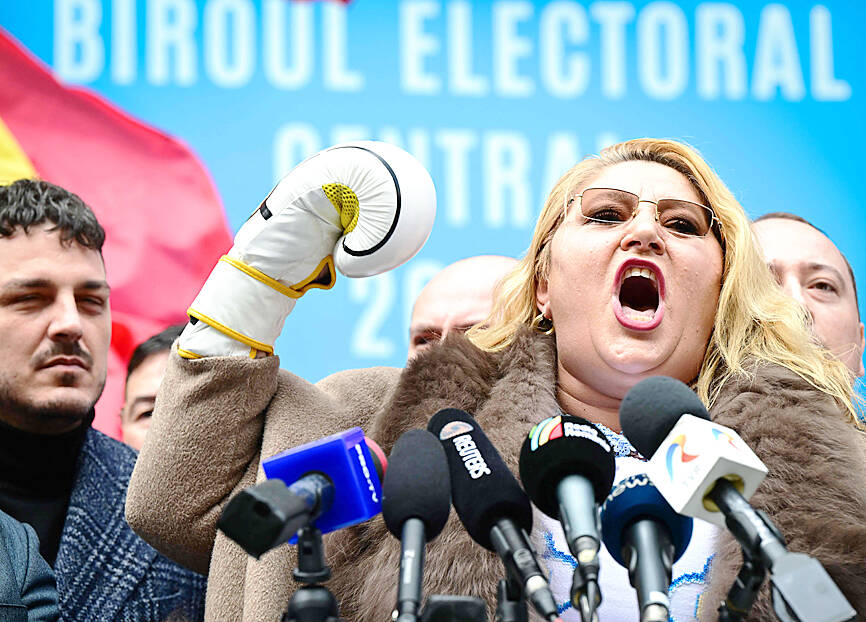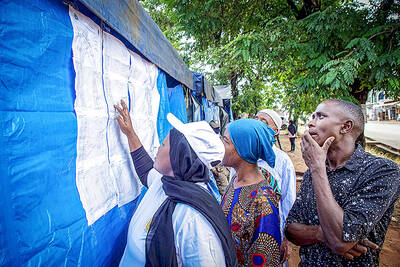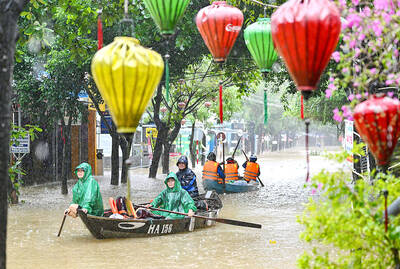Romania’s electoral commission on Saturday excluded a second far-right hopeful, Diana Sosoaca, from May’s presidential election, amid rising tension in the run-up to the May rerun of the poll.
Earlier this month, Romania’s Central Electoral Bureau barred Calin Georgescu, an independent who was polling at about 40 percent ahead of the rerun election.
Georgescu, a fierce EU and NATO critic, shot to prominence in November last year when he unexpectedly topped a first round of presidential voting.

Photo: AFP
However, Romania’s constitutional court annulled the election after claims of Russian interference and a “massive” social media promotion in his favor.
On Saturday, an electoral commission statement said it had also taken the “decision to reject the candidacy of Diana Sosoaca.”
It said that the country’s constitutional court had already banned her from standing in last year’s election for making declarations “contrary to democratic values.”
However, the electoral office did validate the candidacy of George Simion, leader of the far-right Alliance for the Union of Romanians (AUR).
Following the exclusion of Georgescu, he is the most prominent figure on the far right still in the running.
Sosoaca, a 49-year-old member of the European Parliament known for her pro-Russia views wrote on Facebook: “I am proof that we do not live in a democracy.” She said she would appeal the ruling.
On Thursday, she donned boxing gloves as she filed her candidacy, declaring herself ready to “fight the system once again” as she bids to “make Europe and Romania great again,” borrowing terms from US President Donald Trump.
Sosoaca has been accused of spreading pro-Kremlin propaganda and anti-Semitic views.
In July last year, she was expelled from the European Parliament in Strasbourg after loudly interrupting debates.
Her small party, S.O.S. Romania, won 24 seats after securing about 7 percent of votes in Romania’s legislative elections in December last year.
Romania has been plunged into chaos since Georgescu’s surprise emergence last year on the back of a huge TikTok social media campaign, which was marred by suspicions of Russian interference.
In a shock decision, the November election was cancelled and this week Georgescu was definitively excluded from the election, the first round of which is scheduled for May 4.

With much pomp and circumstance, Cairo is today to inaugurate the long-awaited Grand Egyptian Museum (GEM), widely presented as the crowning jewel on authorities’ efforts to overhaul the country’s vital tourism industry. With a panoramic view of the Giza pyramids plateau, the museum houses thousands of artifacts spanning more than 5,000 years of Egyptian antiquity at a whopping cost of more than US$1 billion. More than two decades in the making, the ultra-modern museum anticipates 5 million visitors annually, with never-before-seen relics on display. In the run-up to the grand opening, Egyptian media and official statements have hailed the “historic moment,” describing the

‘CHILD PORNOGRAPHY’: The doll on Shein’s Web site measure about 80cm in height, and it was holding a teddy bear in a photo published by a daily newspaper France’s anti-fraud unit on Saturday said it had reported Asian e-commerce giant Shein (希音) for selling what it described as “sex dolls with a childlike appearance.” The French Directorate General for Competition, Consumer Affairs and Fraud Control (DGCCRF) said in a statement that the “description and categorization” of the items on Shein’s Web site “make it difficult to doubt the child pornography nature of the content.” Shortly after the statement, Shein announced that the dolls in question had been withdrawn from its platform and that it had launched an internal inquiry. On its Web site, Le Parisien daily published a

UNCERTAIN TOLLS: Images on social media showed small protests that escalated, with reports of police shooting live rounds as polling stations were targeted Tanzania yesterday was on lockdown with a communications blackout, a day after elections turned into violent chaos with unconfirmed reports of many dead. Tanzanian President Samia Suluhu Hassan had sought to solidify her position and silence criticism within her party in the virtually uncontested polls, with the main challengers either jailed or disqualified. In the run-up, rights groups condemned a “wave of terror” in the east African nation, which has seen a string of high-profile abductions that ramped up in the final days. A heavy security presence on Wednesday failed to deter hundreds protesting in economic hub Dar es Salaam and elsewhere, some

Flooding in Vietnam has killed at least 10 people this week as the water level of a major river near tourist landmarks reached a 60-year high, authorities said yesterday. Vietnam’s coastal provinces, home to UNESCO world heritage site Hoi An ancient town, have been pummeled by heavy rain since the weekend, with a record of up to 1.7m falling over 24 hours. At least 10 people have been killed, while eight others are missing, the Vietnamese Ministry of Natural Resources and Environment said. More than 128,000 houses in five central provinces have been inundated, with water 3m deep in some areas. People waded through